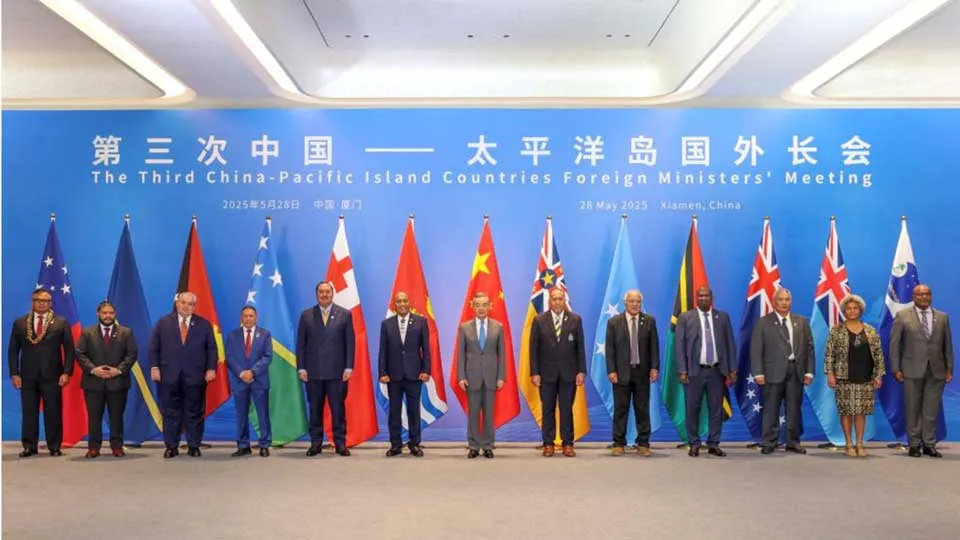
Chinese Foreign Minister Wang Yi (C) hosted envoys from the Pacific Islands Forum on 28 and 29 May. Image: Xinhua.
In the heart of the Pacific, where small island nations navigate between Beijing's economic promises and Washington's strategic pressures, a quiet yet globally significant contest is unfolding. The recent denial by the Chinese embassy in Fiji regarding alleged plans to build military bases in the region is merely the latest move in a long series of actions and counteractions within an increasingly militarized context.
Beijing, aware of local public opinion sensitivities and the suspicion harbored by Australia and the United States, has refined a strategy centered on gradualism: deployment of police officers to the Solomon Islands, strengthened diplomatic presence in Kiribati and Vanuatu, and dual-use (civilian and military) infrastructure investments in Fiji. Each move is officially presented as development cooperation or security partnership, but Western analysts point to a broader plan aimed at transforming these islands into nodes of a network capable of supporting Chinese military projection in the event of a crisis.
China’s interest in the Pacific is not new, but over the past decade it has intensified alongside the expansion of its navy and its ambition to undermine U.S. hegemony in the Asia-Pacific. There is also an economic rationale: privileged access to fish stocks, timber, and critical minerals essential to China’s tech industry.
Washington has not remained idle. As early as 2018, it blocked Chinese attempts to upgrade a naval base in Papua New Guinea and another in Fiji, thanks to a diplomatic offensive in which Canberra played the role of “regional policeman.” In 2022, the signing of a security pact between Beijing and the Solomon Islands prompted the U.S. State Department to issue an unambiguous warning: the construction of a permanent Chinese military base would be considered a strategic threat and would prompt an immediate response.
Today, as China flexes its muscles with ballistic missile tests flying over Fiji and other islands, U.S. Deputy Secretary of State Kurt Campbell has urged the Trump administration to remain vigilant. The small Pacific islands, often marginal on geopolitical maps, risk becoming pawns in a power struggle between major nations, sacrificing their decision-making autonomy.
China insists on mutual respect for sovereignty and denies any plans for military projection in the Pacific. However, Beijing does not need formal bases to influence the region: it can rely on civilian infrastructure that can be militarized if needed, on ports modernized by Chinese companies, and on a widespread police presence “to support internal security” in the most fragile countries.
The Pacific thus becomes a testing ground for a new form of global rivalry: a battle of positioning driven more by economic promises and strategic narratives than by invasions or territorial conquests. In this context, the ability of island states to maintain an autonomous foreign policy will face a severe test.